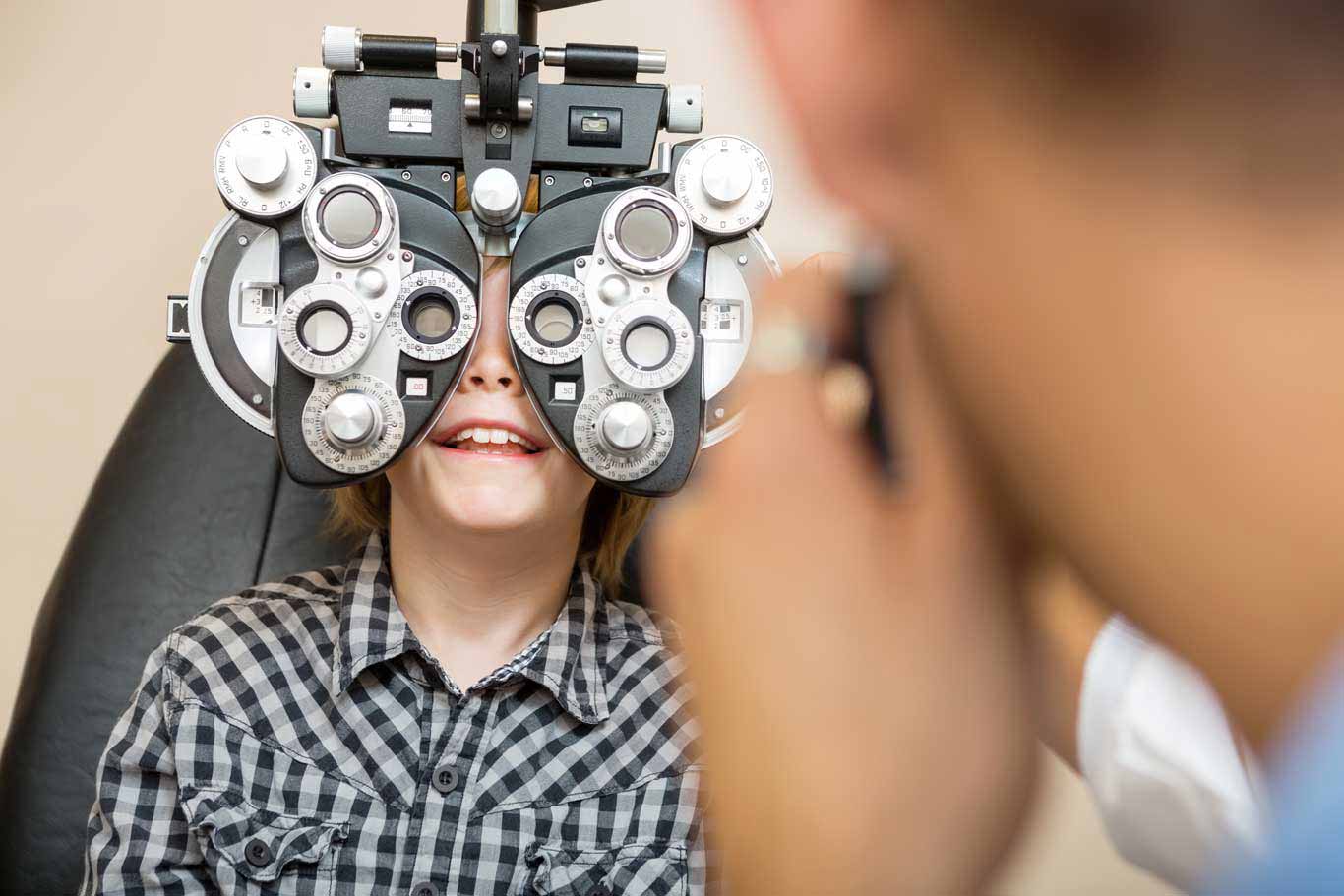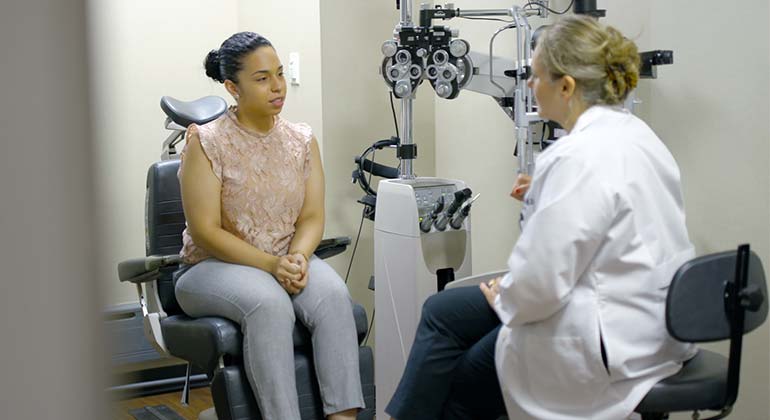The Value of Routine Eye Exams: Insights From a Seasoned Optometrist
Routine eye tests serve as an important part of health care that extends beyond simple vision modification. An experienced eye medical professional can offer understandings right into exactly how these assessments not just detect usual eye conditions yet likewise expose underlying wellness issues that may otherwise go unnoticed.
Benefits of Regular Eye Exams
Although lots of individuals may ignore the relevance of regular eye tests, these evaluations play an essential role in maintaining general health and wellness and well-being. Routine eye evaluations serve not just to evaluate vision but also to spot very early signs of systemic health issues, including diabetes mellitus and hypertension. By identifying these problems at their beginning, clients can get timely treatments, considerably improving long-term end results.
In addition, eye examinations can aid in keeping track of existing health and wellness issues, ensuring that any type of adjustments in vision or eye health and wellness are quickly dealt with (optometrist). The assessments enable tailored suggestions pertaining to eyewear, way of life adjustments, and protective measures versus potential eye strain or damages
Beyond physical health and wellness, the advantages of regular eye tests reach boosting top quality of life. Boosted vision helps with far better performance in day-to-day tasks, from reading to driving, therefore adding to greater independence and safety. Inevitably, prioritizing eye tests cultivates an aggressive technique to health and wellness monitoring, empowering people to take charge of their health. Routine check-ups are an essential component of a detailed medical care strategy, making certain that both vision and general health and wellness are maintained throughout life.
Common Eye Conditions Detected
Normal eye examinations are instrumental in detecting a selection of common eye problems that can substantially impact vision and total health. Amongst the most widespread conditions recognized during these examinations are refractive mistakes, including nearsightedness (nearsightedness), hyperopia (farsightedness), and astigmatism. These problems commonly manifest as blurred vision and can be conveniently fixed with prescription glasses or call lenses.
Furthermore, cataracts, which create clouding of the lens, are frequently identified in older grownups. This condition can cause diminished vision and needs medical intervention for resolution. One more usual issue is glaucoma, a group of eye conditions that damage the optic nerve, commonly connected to enhanced intraocular stress. Early discovery is essential as it can stop irreparable vision loss.
Age-related macular deterioration (AMD) is an additional significant condition that impacts main vision, specifically in people over 50. Ultimately, diabetic retinopathy, a problem of diabetic issues, can cause extreme vision problems otherwise monitored frequently. With detailed eye examinations, these problems can be recognized early, permitting prompt monitoring and treatment to protect vision and improve high quality of life.
Value of Very Early Detection
Early discovery of eye problems plays an essential function in protecting vision and avoiding significant wellness difficulties. Lots of eye illness, such as glaucoma, diabetic retinopathy, and age-related macular deterioration, can advance silently without noticeable signs and symptoms in their onset. By the time signs and symptoms show up, permanent damage might have occurred, causing irreversible vision loss.
Routine over here eye examinations facilitate very early medical diagnosis, enabling for prompt intervention and therapy. For example, treating raised intraocular pressure can prevent the start of glaucoma, while handling blood sugar level levels can significantly lower the risk of diabetic person retinopathy. Additionally, problems like cataracts can be efficiently taken care of with surgical treatment when identified early.

Exactly How Often Should You Go To?
Establishing the frequency of eye examinations is crucial for maintaining ideal eye wellness and vision. The basic recommendation for adults is to have an extensive eye test every one to two years, relying on specific threat factors and age. For individuals aged 18 to 60, a test every 2 years is generally adequate if no vision troubles exist. Nonetheless, those over 60 should consider annual examinations, as the threat of age-related problems increases considerably.
People with details threat aspects, such as a household history of eye disease, diabetes, or existing vision problems, may call for even more constant examinations. Kids ought to have their first eye exam at six months old, adhered to by extra examinations at age three and before getting in college. Normal examinations during childhood years are important as vision can alter quickly during developmental years.
Ultimately, the frequency of visits need to be customized per person's conditions, consisting of way of life, work risks, and any kind of pre-existing eye problems. Consulting with an eye care professional can give customized recommendations, ensuring that your eye wellness is consistently kept an eye on and maintained.
Tips for Your Eye Test
Planning for your site web eye examination can enhance the performance of the check out and guarantee a comprehensive assessment of your eye health. To optimize your time with the eye physician, it is essential to collect appropriate information before your visit. Beginning by assembling a listing of any type of drugs you are currently taking, consisting of non-prescription drugs and supplements, as these can influence eye health and wellness.
Furthermore, document any type of symptoms you have actually experienced, such as obscured vision, discomfort, or frustrations. This info will certainly aid your eye doctor in detecting possible issues. If you wear glasses or get in touch with lenses, bring them along, also if you don't wear them on a regular basis. This will aid the doctor evaluate any type of modifications in your vision.
It is also useful to have a household background of eye problems at hand, as hereditary elements can contribute to your eye health and wellness. Finally, consider arranging your examination for a while when you are much less rushed, enabling you to ask concerns and discuss your concerns thoroughly. By preparing properly, you make certain that your eye examination is efficient and that your optometrist has all the essential details to give the very best treatment possible.

Verdict
Routine eye exams play a crucial duty in keeping both vision and general health. They promote the very early detection of numerous eye conditions and systemic issues, enabling timely intervention. The referrals for frequency highlight the importance of positive care. Implementing basic preparatory pointers can improve the evaluation experience. Inevitably, prioritizing comprehensive eye look at more info analyses contributes significantly to the conservation of vision and the improvement of lifestyle, underlining the need of routine eye treatment in preventive health care strategies.
Regular eye examinations are instrumental in finding a range of usual eye conditions that can dramatically affect vision and total health.Figuring out the regularity of eye examinations is essential for preserving optimum eye health and vision.Preparing for your eye exam can improve the performance of the visit and make sure a thorough assessment of your eye health and wellness (optometrist). By preparing appropriately, you ensure that your eye examination is efficient and that your eye physician has all the needed details to offer the ideal care possible
Eventually, focusing on thorough eye evaluations contributes considerably to the conservation of vision and the renovation of quality of life, underscoring the necessity of routine eye care in precautionary medical care strategies.